Essay
Eparchy of Irkutsk
Irkutsk eparchy was established in 1727. The first bishop Innokentii Kulchitskii, later ranked among the saints, headed it. In the Irkutsk history there were many things, connected with Innokentii. He started enlightenment; during his rule first (Russian-Mongolian) school began to work in Irkutsk Voznesenskii Monastery. He developed goal-directed missionary work and regulated church-administrative system. Innokentii brought first private library, different books and manuscripts in Irkutsk, presently kept in the zonal scientific Irkutsk State University library. He also became first spiritual regional writer, having left handwritten sermon collection for Irkutsk people. In the late XIX century a priest Modest, an Irkutsk spiritual seminary rector, published Innokentii’s “Preachings”. Innokentii died in 1731, and in 70 years his relics were found to be not ephemeral. In 1804 he was canonized.
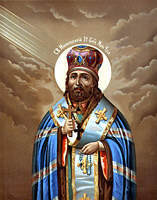
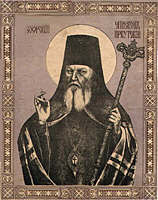
Siberian orthodox church history knows the names of other ascetics. Sofronii Kristalevskii, third Irkutsk bishop, ruled the eparchy in 1754-1771. That was the time of stone church construction, orthodox religion spread among aboriginal people. He took care of education of clergy and transfered the school from Voznesenskii Monastery to the bishop’s house. He himself teached in this school and improved its condition. St.Sofronii died in 1771. Evidences of miracles connected with his name and relics lived among irkutians and… In the early XX century Irkutsk clergy were intensively preparing materials for his canonization.
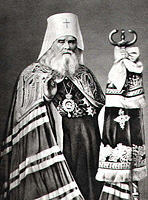
Ioann (Innokentii) Veniaminov, born in a village Anga and an Irkutsk spiritual seminary alumnae, became world known. He was famous for his apostolic work among Alaska and the Aleutian Islands aboriginal inhabitants. He was an initiator and participant of chirch constraction in such a remote region of Russia. Every parish had a school for aborigenal children. Innokentii Veniaminov wrote and published “Aleutian Grammar”, “Notes on the iselands of Unalashka Region” and other scientific works. He made Aleutians acqainted with construction of buildings, carpentry and other crafts. Later he was elected to become Moscow and Kolomenskii mitropolit (archbishop). Canonized in 1988.
Irkutsk eparchy clergy representatives were deeply involved in scientific work, ethnographical and linguistic studies, and translations. An important place was taken by enlightenment work in their activities. In 1898-1899 religious-moral readings were held in the seminary on Sundays. In 1912 “Church historical and archeological society” was organized in Irkutsk; its goals were to investigate, keep and study old churches. There was a ramified net of church educational establishments – the Spiritual seminary, spiritual rank girl school, more than 200 church-parish schools.
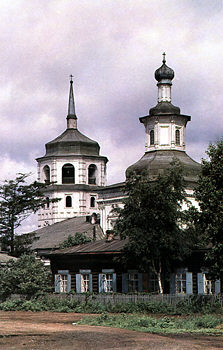
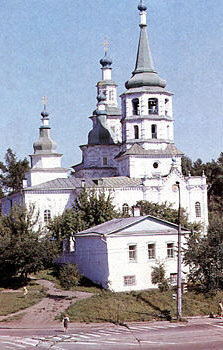
By the early XX century Irkutsk had 2 monasteries – male Voznesenskii and female Znamenskii, 2 cathedrals – Kazanskii and Bogoyavlenskii, 38 parish churches and several chapels. During the Soviet power most part of parishes were destroyed; the church buildings were used for other purposes. In the present time situation slowly changes – new parishes have been opened, and there are intense restoration works in the city. There are 10 churches in Irkutsk now: Znamenskaya, Krestovozdvizhenskaya, Mikhail-Archangel; divine service began in a restorated cathedral of Bogoyavleniya, Troizkoi and Knyaze-Vladimirskoi churches. There is service in some churches, which have not been restorated, in temporary buildings in Nikolo-Innokentyevskii and Uspenskii churches.




